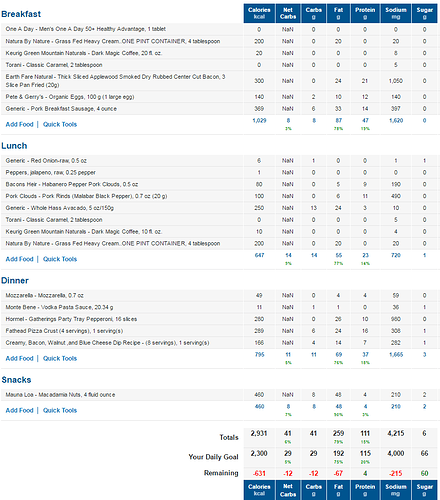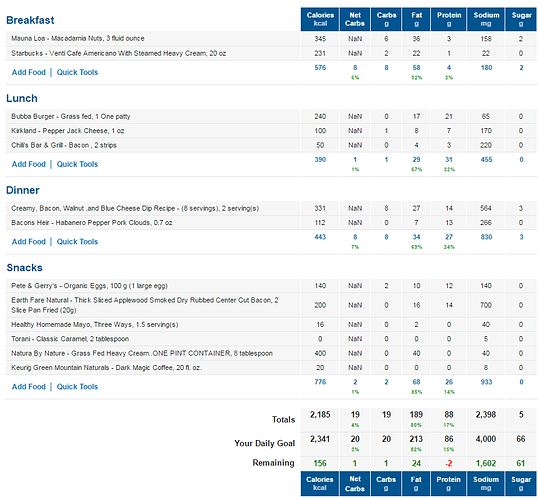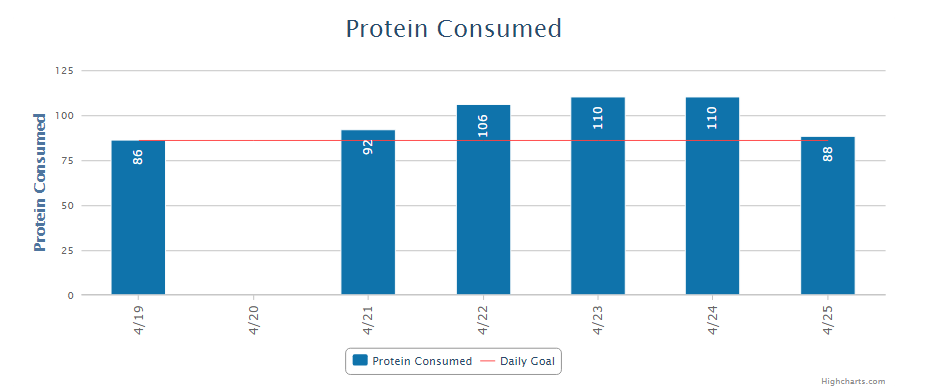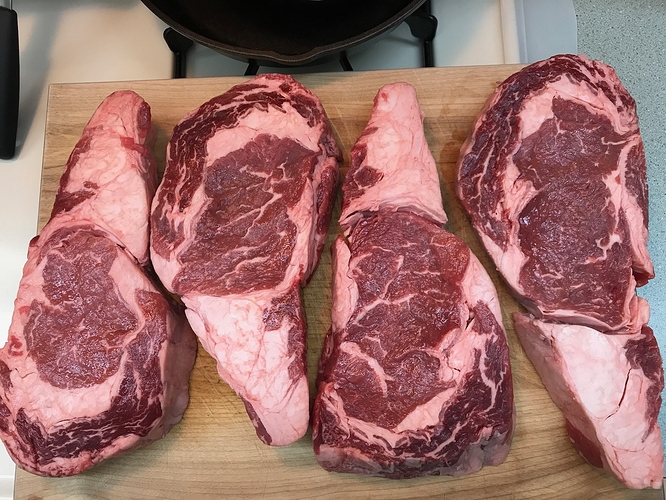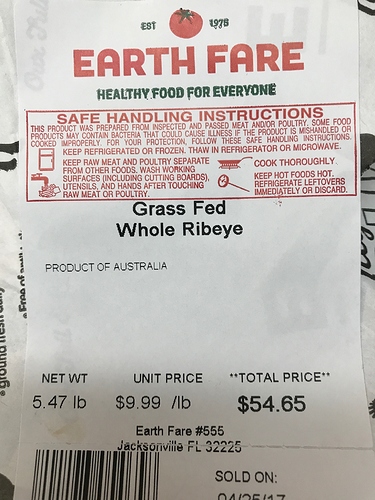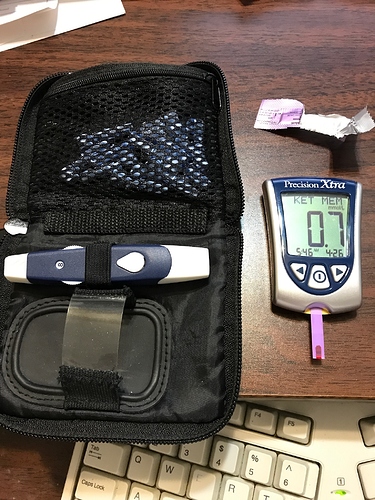Also we announced KetoFest funding for the first time on it. 
A really extended fast: going for 46-days!
I still don’t understand why it is neccessary to fast for higher ketone levels.
When i fast i live mostly from fat with some protein.
When i eat keto i live mostly from fat with some protein.
But on a fast my ketones go as high as 5, while when eating keto they remain at about 1.
Ok, i certainly have more protein when i eat, but i would still expect a more or less linear correlation.
Is there maybe local fat-burning within the tissues during a fast? I mean, why shuttle it around if the source and target are the same place?
@Sascha_Heid Yes, you have similar macronutrients whether feasting or fasting. When feasting you are consuming fat with some protein and your body is burning that high quality fat and using the ingested protein for replacement and repair functions where needed through out the body. Excess protein may be converted into carbohydrates mostly for storage as adipose tissue or body fat. In this situation there is not a high requirement for ketones to be created so the level is lower.
When fasting you are still burning fat but mostly from ketones. Ketones are a byproduct of lipolysis which is the initial conversion triglycerides from your adipose tissues into fuel. In other words, when actually burning your body fat there are 2 burns, conversion of a triglyceride into glucose and 3 fatty acids that help form the ketones, and not only 1 when carbs are used for energy! When fasting and not ingesting any energy your body will switch over to burning your body fat which raises the ketones you see in your blood measurement!
The important thing here is that ketones are the byproduct of lipolysis which is stimulated by a number of hormones with the main one being glucagon. If your body is used to burning sugar, which means glucose and insulin are at higher levels, then glucagon is stifled by the insulin and you cannot adequately burn body fat. Once insulin is reduced to the point that the pancreas can produce more glucagon then your body is on its way to being fat adapted. This change, the lowering of insulin, is the necessary event that everyone starting on the ketogenic diet must wait for.
Again, and specific to you: I am assuming that you are fat adapted already as your ketone readings are in the 0.5-3.0 mmol/l range so when you are eating your typical ratios of proteins and fat your body doesn’t need to created much energy but it does go through lipolysis on a regular basis as you replace old stuff with new stuff all the time. Being that you don’t have extra carbs to be stored you burn a minimal amount of fat each day but don’t replace it so over time you are losing weight.
When fasting, your body must produce all of the energy you need to burn in the day so we can think of it as the furnace burning hotter and producing more byproduct; ketones!.
Day 55 of my experiment, completed 46 days fasting and am now 9 days feasting. I was able to listen to episode 64 of the 2KetoDudes podcast which is all about my journey! Here are my numbers for today:
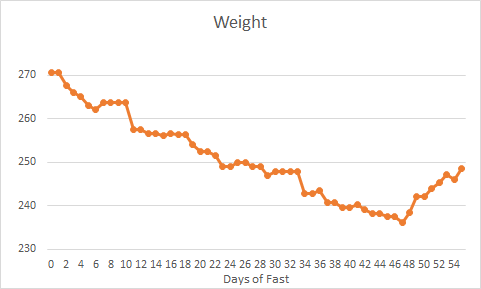
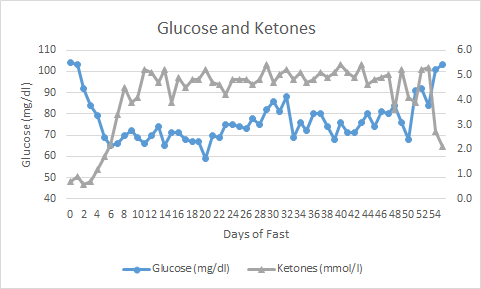

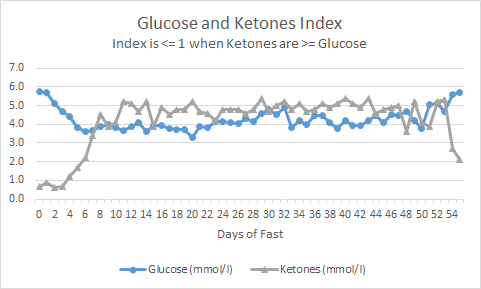
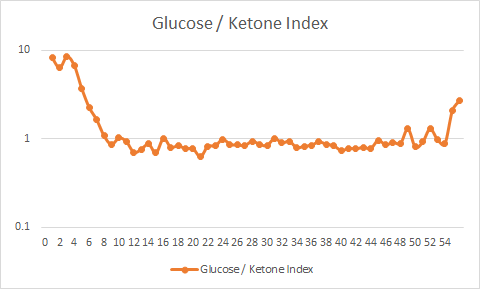
I’ve been told that I have a bad speech habit of saying ‘and stuff’ way too often and I really heard it in the podcast! I apologize to everyone who found it a bit annoying, I sure did.
Using MyFitnessPal.com and the MFP apps allows me to really track what I eat and it is helping me to see what percentage of my calories are coming from fat. I am targeting 70+% each day and have been doing a fairly good job of keeping it there.
It is the protein and carbs that I need to control and unfortunately a lot of the foods I eat have plenty of fat but also contain protein and carbs. The added tickler for protein is that I need to eat enough each day for my body’s maintenance needs but not too much that the excess can cause minor issues with my ketone levels.
It appears that days where I exceed 100 g of protein my blood ketone levels drop and my blood glucose levels go quite a bit higher. I have seen this by looking at just the last week and I will continue to track this to see if it is a trend! Carbs don’t seem to have as much effect on the glucose and ketones as long as they are controlled: in other words, I haven’t had any issues even on days that I doubled or better the limit on carbs I’d like to keep.
This is telling me that I should test differing amounts of proteins and track the differences—maybe I’ll try to add more data and another graph to my spreadsheet! After all, this is a N=1 experiment so I can do whatever I need to learn things! It may take me a few days to catch up and then we will see what happens.
My goal is to keep my protein for the next few days to 92 g or less ( they were 111 g today!)
Ron, you did an EXCELLENT job on the podcast walking the listener through your fasting journey and all the details!
Yep, I second that!! Great job and so great that you kept us posted along the way @ron-coleman - meant for really interesting reading.
Day 56 of my experiment, completed 46 days fasting and am now 10 days feasting. I was able to limit my protein very well and had a great visit with my doctor! Here are my numbers for today:
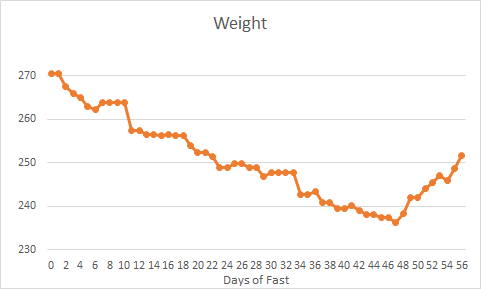
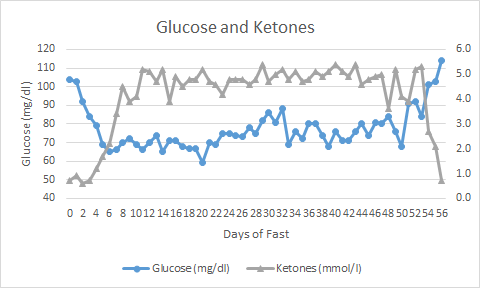
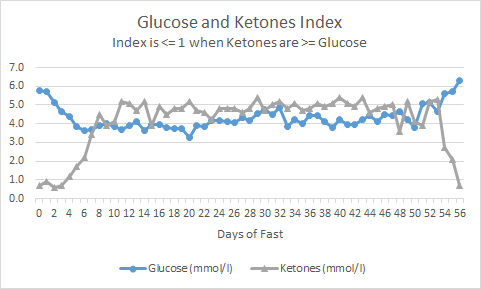
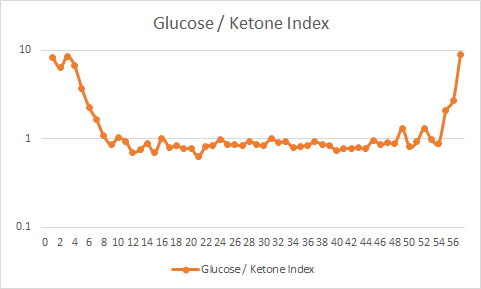
I said that I was going to limit my protein the next few days to investigate the impact on my blood glucose and ketones. Using the rule of thumb that protein should 1 to 1.5 grams protein for each kilogram of lean body mass (LBM) I needed to find my LBM. Since I’ve not had a DEXA scan to determine my exact LBM I used an estimation based on BMI. I found my estimated weight at BMI = 25% and then determined what the remaining 75% was for my estimated LBM.
My calculations showed that my protein should be in the range of 64 to 96.5 g of protein per day and I am shooting for 86 to 92 for the first part of this test. I did reach 88 g protein today and I am happy.
I was going to have a full fat grass fed ribeye; this is where they leave the ‘eye’ fat on the steaks. They were nice and gave me a 30% discount off the sale price as I accepted all of the fat which they would just throw away—poor me! These steaks are 23 ounces each!
I got a chuckle when I saw the line on the receipt: “PRODUCT OF AUSTRALIA.” An Yes, that amount is before the discount, I paid $6.99!
I have been feasting so I had a variety of small portions in addition to a grass fed sunrise burger for lunch (5 oz burger with pepper jack cheese and a fried egg on top.) Long story short, I didn’t have enough room for even a 4 oz piece of the ribeye so I will fast tomorrow and have me a nice piece of ribeye for dinner!
My doctor visit went very well today! As I’ve said before he is young and has an open mind. He admitted that he really doesn’t understand how my diet has done all these things as they are all the exact opposite that he learned in school. I printed out my spreadsheet with all of the data and the graphs from my fast and he was ecstatic “You have data!” With a giant smile on his face he asked me about my ketones and how high they had gone. I also told him about my current experiment of limiting my protein to see what effects it has on me.
My cholesterol markers had slipped a bit as Dave Feldman’s experience foretold, and @richard reminded me on the podcast, but he said that it did not concern him as all the markers of inflammation are very, very low. He said that with these markers that cholesterol doesn’t concern him at all!
My wife also went with me as she has been concerned about this diet and the long, 46-day fast. Many of our friends, in the medical business, have been mentioning to her that my diet is going to destroy my kidneys and liver and so she asked the doctor if there is a risk to me. All of the blood tests we do check the liver and kidney enzymes every time and he showed her the numbers and said “They are all getting better each time we look, I’ve never seen this before!” She then asked about long term damage and he repeated: all of the markers are improving!
He continued by talking about how processed carbs do contribute a huge load to the massive epidemics that we have for obesity, diabetes, liver disease, and many other issues and I am a poster child for how by removing the processed carbohydrates from my diet I was able to heal myself. He has obviously been reading a lot more about this and is becoming more interested in my little experiments and other things that I may find.
On our drive home I asked my wife what she thought about this visit as she has been very cautious about my way of eating for the last 21 months. She told me that it seems to work for me and that it is something that I can stick with but she still doesn’t feel comfortable enough to say that she supports what I am doing. It will not do any good for me to ‘show her the science’ as she is not technical and the ketogenic way of life goes against every dietary thing she has been taught. Surprisingly, she tried listening to the 2KetoDudes podcast that I was on but she couldn’t get through the first 10 minutes as it became too technical and she quickly lost interest.
I can only pray that one day she will see the light and will work to support me as I try to encourage members of our family with severe obesity, metabolic syndrome, diabetes, Alzheimer’s disease, and a lot of other ailments that could be improved by diet. Please pray for her!
Maybe have her listen to Episode number 1. Not too sciencey and explains Keto and its benefits in a way that is easily grasped.
So great to hear how excited and open minded your doctor is!!
you have done so many amazing things with this fast, including educating your doctor. This is a great service to your community as well as advancing the ketogenic lifestyle. Rock on my friend!
Very impressive and inspiring topic to read. Thanks for sharing all this.
I am wondering, what test or tool do you use to get all those numbers?
I use 2 devices: my scale for my weight in pounds and a Abbott Precision Xtra Blood Glucose/Ketone meter (I believe the meter is called Freestyle Optium outside of the US.)
I have a spreadsheet where I enter the 3 values: weight in pounds, glucose in mg/dl, and ketones in mmol/l and the spreadsheet does all of the other calculations for me. I will share the spreadsheet with anyone who is interested.
Noice
Sorry about that. We do sometimes go there … who am I kidding? We kind of live there 
That is one of the things I like about it!
I loved the episode and really didn’t notice the “and stuff”!!! Great hearing your voice and I’m glad you got to be a guest.
+1
When reading your (@ron-coleman) comment about it, I was about 1/3 of the way through the episode, and I assumed that, having been warned about it, I would be particularly focused on that verbal tic, but I didn’t notice it at all.
Nice job on the podcast, IMO.
Ron, I’ve been silently watching and cheering for you from the beginning of this thread on your awe inspiring fasting journey and impressed that you set and then reached such an ambitious goal. I’ve also had a concern which I hoped to see discussed but have been hesitant to bring up myself, the risk of lean tissue loss. I’m very interested in the many beneficial aspects of fasting discused by Jason Fung and others, and have been dipping my toes in the water with a variety of approaches such as IF, 2 to 3 day water fasts and somewhat longer stints of very low calorie, mostly fat eating.
Stephen Phinney expresses strong reservations about fasting, especially extended fasting, with lean tissue loss a primary concern and it makes me hesitant to fully trust the argument that our bodies are smart and evolved to handle starvation/fasting gracefully prioritizing recycling of damaged tissue and sparing muscle. I believe a keto diet has great benefits for making fasting easier and perhaps reducing muscle loss in the transition to a fully fasted state. But I also am recovering from metabolic syndrome / pre-diabetes brought on in part by an “untreatable” genetic neuro-muscular wasting disease which has me somewhat obsessed now about trying to optimize muscle performance. Perhaps both Phinney and Fung are right, for some people and some approaches it is a non-issue but for others it may be a significant problem.
I still have excess fat to lose but a scale isn’t a good tool for me to track it since it doesn’t discriminate what is being lost. I bought a new scale that estimates body composition by electrical impedance but it suffers from both a lack of accuracy and a lack of consistency which makes it at best only useful for spotting trends on longer time scales that can as readily be seen by taking photos. I’ve also been using skinfold calipers which are better than the scale but still have limitations that make it hard to optimize body composition through the complex interactions of diet, fasting and exercise over short time periods. Dexa scans would give better feedback but due to cost, radiation and inconvenience I’m not going to get them often enough to learn what approach to fasting best meets my goals.
Unfortunately I have more questions than answers and less experience with fasting than you. I’m curious to know if you’ve attempted to determine your lean body mass and what your impression of how it has changed through your fast and refeeding and if you have given any thought to maximizing fat loss by sparing lean tissue or maximizing BMR on future fasts?
You might be interested in this from r/fasting on Reddit. https://redd.it/67nilc
Six week fast, plus two weeks refeeding. DEXA scans before and after, and LBM went from 147.2 lbs to 150.6 lbs while going from 17.8% BF to 8.5%.
@brownfat Todd, I am obviously not a doctor so my knowledge is limited to what I have read and what I have experienced in the last 8 months that I have done fasts.
By far, the DEXA scan will be the most accurate for you. Because of your “untreatable” condition could your doctor order the scans for you a few times a year so that your insurance will at least help you cover the cost. It seems to me that your genetic neuro-muscular wasting disease is really worth tracking especially to see if any of your dietary changes are helping or slowing your condition.
I may suggest you contact Dr. Jason Fung at his Intensive Dietary Management web site. If you are in or near the Toronto area you can just stop in or contact them. If you live outside of Canada then you could try their Long Distance Program. I am sure they can help to give you references and information about your specific needs.
I you use the Long Distance Program you will still have to go through your own doctor as Dr. Fung will not be able to prescribe or request any tests but only give you counseling and information from his experience.
If that is too expensive then you may want to send a specific question to FastingTalk.com where Jimmy Moore, Dr. Fung, and Megan Ramos, from the IDM office, answer tons of questions on fasting.



